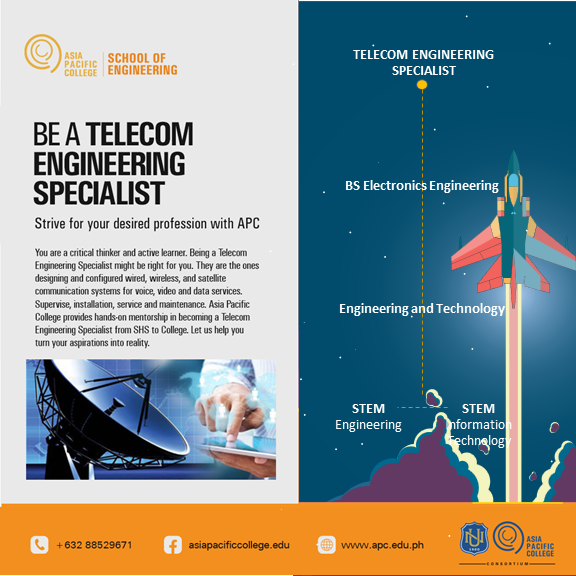
The Bachelor of Science in Electronics Engineering (BS ECE) is a four-year trimestral degree program which aims to produce certified electronics engineers who can conceptualize, design, and implement innovative electronic, computer, and communication systems, devices, goods, services, and processes.
Its courses cover the following:
- Broadcast communication
- Telecommunications
- Semiconductor device fabrication and manufacturing
- Very-Large-Scale Integration (VLSI) design
- Signal processing
- Industrial electronics
- Biomedical electronics
BS Electronics Engineering (BS ECE) requires two trimesters of internship in locally recognized engineering or engineering-related institutions to let students apply the knowledge of design and analysis to the professional practice of electronics engineers.
It also includes two trimesters of integration to prepare would-be graduates for the licensure examinations of Electronics Engineering which are administered by the Professional Regulations Commission (PRC).
Electronics Engineering Program Educational Objectives
- Engage in engineering principles and practices to design solutions and develop electronics
devices or systems that meet technological needs. - Exhibit commitment to obligation and good character of service to the sustainability of electronics
engineering work as a solution to societal needs. - Pursue professional licensure examinations, and/or continuous professional development in
electronics engineering or related fields.
Electronics Engineering Graduate Student Outcomes
EE 1. Apply knowledge of mathematics, natural science, engineering fundamentals and an
engineering specialization to the solution of complex engineering problems.
EE 2. Conduct investigations of complex problems using research-based knowledge and
research methods including design of experiments, analysis and interpretation of
data, and synthesis of information to provide valid conclusions.
EE 3. Design solutions for complex engineering problems and design systems,
components or processes that meet specified needs with appropriate consideration
for political, manufacturability, sustainability, economic, public health and safety,
cultural, societal, ethical and environmental considerations.
EE 4. Function effectively as an individual, and as a member or leader in diverse teams
and in multi-disciplinary settings.
EE 5. Identify, formulate, research literature and analyze complex engineering problems
reaching substantiated conclusions using first principles of mathematics, natural
sciences and engineering sciences.
EE 6. Apply ethical principles and commit to professional ethics and responsibilities and
norms of engineering practice.
EE 7. Communicate effectively on complex engineering activities with the engineering
community and with society at large, such as being able to comprehend and write
effective reports and design documentation, make effective presentations, and give
and receive clear instructions.
EE 8. Understand and evaluate the sustainability and impact of professional engineering
work in the solution of complex engineering problems in a global, economic, societal
and environmental contexts.
EE 9. Recognize the need for, and have the preparation and ability to engage in
independent and life-long learning in the broadest context of technological change.
EE 10. Apply reasoning informed by contextual knowledge to assess societal, health, safety,
legal and cultural issues and the consequent responsibilities relevant to professional
engineering practice and solutions to complex engineering problems.
EE 11. Create, select and apply appropriate techniques, skills, resources, and modern
engineering and IT tools, including prediction and modelling, to complex engineering
problems, with an understanding of the limitations.
EE 12. Demonstrate knowledge and understanding of engineering management principles
and economic decision-making and apply these to one’s own work, as a member
and leader in a team, to manage projects and in multidisciplinary environments.
EE 13. Understand at least one specialized field of electronics engineering practice.






